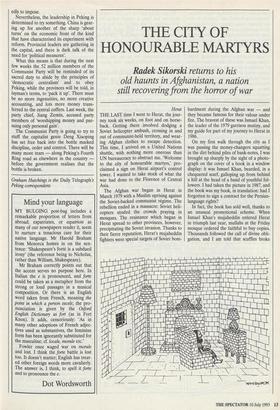Mind your language
MY BULGING post-bag includes a remarkable proportion of letters from abroad; expatriates, or expatriots as many of our newspapers render it, seem to nurture a tenacious care for their native language. Mr Harold Braham from Menorca homes in on the sen- tence: 'Shakespeare's forte is a subdued irony' (the reference being to Nicholas, rather than William, Shakespeare).
Mr Braham correctly points out that the accent serves no purpose here. In Italian the e is pronounced, and forte could be taken as a metaphor from the strong or loud passages in a musical composition. Or there is an English word taken from French, meaning the point in which a person excels; the pro- nunciation is given by the Oxford English Dictionary as fort (as in Fort Knox). It adds, censoriously: 'As in many other adoptions of French adjec- tives used as substantives, the feminine form has been ignorantly substituted for the masculine; cf. locale, morale etc.'
Fowler once waged war on morale and lost. I think the forte battle is lost too. It doesn't matter; English has treat- ed other foreign words more cavalierly. The answer is, I think, to spell it forte and to pronounce the e.
Dot Wordsworth


















































 Previous page
Previous page